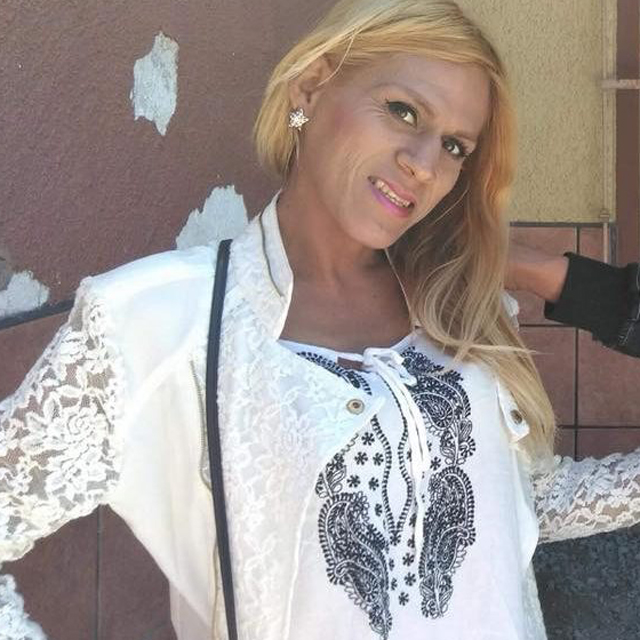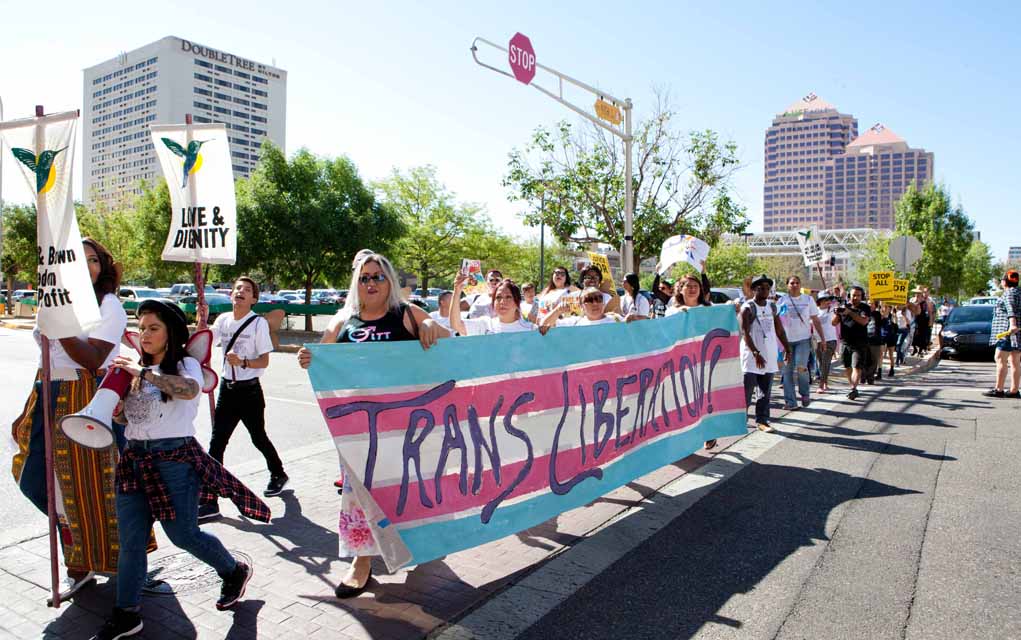
This story was updated on Feb. 12 to reflect comments received from ICE post publication.
In Estella’s home country of Cuba, transphobia is rampant, she says. She’s been attacked. She’s been targeted by police. There are no human rights, she says. There is no access to HIV medication.
“I preferred to risk my life than continue that way,” she says through her lawyer at the Rocky Mountain Immigrant Advocacy Network (RMIAN). Estella is a pseudonym. She, like many within the transgender community currently detained at the Immigration and Customs Enforcement (ICE) Aurora Contract Detention Facility operated by the GEO Group, Inc., is hesitant to share personal details about where she’s from or the situation that led her to flee to the U.S. Like many transgender people seeking asylum in the U.S. she fled violent transphobia in her home country only to be prolongly detained by ICE in a system, advocates claim, ill-equipped to provide for their specific needs and care.
Being in detention is “dreadful, ugly,” Estella says, according to her lawyer. “We are here asking for asylum and they’re treating us badly. Some of the officers treat us like men. They have a phobia. It’s more of a problem with the women.”
Estella says that being in detention has affected her physically, mentally, emotionally — “Daily and completely, in every sense of the word.”
And she’s not alone. Although the Aurora facility has housed transgender people for some time, the numbers have steadily been increasing since 2019, says Laura Lunn, detention program managing attorney at RMIAN. Then, on Jan. 21, the facility’s trans population more than doubled when several trans individuals were transferred from a correctional facility in New Mexico. The Aurora facility is currently housing 18 trans individuals as of Feb. 13, according to ICE.
This number may fall short, however, Lunn says, given that it often takes weeks or even months for lawyers to fully understand how a person identifies, leaving many people without specific services at all.
“Sometimes people themselves don’t have the vocabulary to describe how they identify in a way that resonates with us here in the United States,” she says. “So my guess is that a lot of people who are identified as male or female may not actually fall into one of those two boxes so easily and that a lot of that information is not being properly captured through the current process that is in place.”
According to a Jan. 27 accountability report from U.S. Rep. Jason Crow (D-Aurora), the transgender individuals at the Aurora GEO facility are being held in three different dorms, at least one of which is a dedicated trans dorm. (ICE confirms “the transgender detainees are currently housed in Aurora South, an annex to the main facility. They are in their own dedicated housing unit” which was opened in 2019.) There is no dedicated medical personnel for this specific population, so, for now, ICE and GEO are working with the Denver Health LGBT Center for Excellence to provide both oversight and care of the mostly trans women currently being detained.
Many of them require hormone therapy, some of them are HIV positive. Others don’t know their HIV status and would benefit from a test. All of them require specialized mental health care, Lunn says.
“Transgender people who are detained have a lot of needs just because there is a mixture of trauma history that is particularly pertinent in these types of cases, and then on top of that most people have profound medical needs,” Lunn says. “Beyond what it means to be detained as a baseline, it is particularly complicated when you have specific social and medical needs.”
In Lunn’s estimation, the best solution is releasing transgender people so that they can have ready access to care whenever it’s required. It’s an opinion shared by many within the immigrant advocacy community, as well as Democratic members of Congress who are working to ensure extra protections for detained transgender individuals.
• • • •
Most of the trans women now being held in Aurora came from the Cibola County Correctional Center in Milan, New Mexico, about 90 miles west of Albuquerque. The trans-specific unit in Cibola was opened in the summer of 2017, after a similar unit was closed in Southern California, and ICE has detained hundreds of transgender and gender nonconforming individuals since.
But claims of medical neglect, lack of mental health care and the use of solitary confinement (administrative segregation, according to ICE) are common, according to the Santa Fe Dreamers Project, a legal advocacy group that has represented about 200 trans women across the country. On Jan. 21, dozens of individuals were unexpectedly transferred out of Cibola, and the unit effectively closed.
Allegra Love, executive director of Sante Fe Dreamers Project, estimates about 95% or so of the women are from El Salvador, Guatemala, Honduras and Mexico, although there are occasionally women from elsewhere, like Eastern Europe and Jamaica, for example.
“They’re facing direct violence from their families, direct violence from their neighbors and their communities, direct violence from law enforcement,” Love says. “We’re talking about deadly transphobia, not just it’s hard to get a job, not just feeling rejected by your society, but your life is in danger when you step out on the streets.”
But the conditions of detention in the U.S. also present unique dangers and challenges for transgender people, Love says. Most of the time people are put into dorms according to their gender assigned at birth, creating dangerous situations of sexual harassment and assault. In 2017, LGBT individuals were victims of 12% of reported sexual assaults in ICE detention, according to the Center for American Progress, despite the fact that they accounted for only 0.1% of the overall detained population.
“They’re at risk for sexual assault, physical assault, for bullying, discrimination, and when they don’t want to be in that detention, what happens is they could get put into solitary confinement,” Love says. “And when they get pushed to the brink being in solitary, then their only choice is to go back into general pop and it’s really two torturous situations.”
Transgender folks also need specified medical attention and unique mental health care, which for the most part has been sub par at best at ICE facilities across the nation, Love says.
In the last two years, at least two trans women claiming asylum died in New Mexico. In the case of Roxsana Hernandez, a transgender woman from Honduras, an independent autopsy paid for by the Transgender Law Center revealed deep bruising, dehydration and complications resulting from untreated HIV. Hernandez was last held at Cibola before being transferred to an ICU at a nearby hospital, where she passed away less than a month after claiming asylum in the U.S. in 2018. About a year later, another trans woman, Johana Medina Leon from El Salvador, passed away four days after being released from the Otero County Processing Center, also in New Mexico.

In June 2019, about two dozen trans women at Cibola signed a letter claiming inadequate medical care and subjugation to psychological and verbal abuse by the guards.
“They treated us like men from the beginning,” says Jade, a transgender woman from Central America currently seeking asylum in the U.S. who was released from Cibola last year. “When I was asking for asylum in Tijuana they took away everything I used to express myself — the feminine things. They took away my hair extensions, my eyelash extensions and my clothes. And [the discrimination] was present during my entire journey.”
Jade, her chosen pseudonym, is only 22. She was kicked out of her house after finishing high school. During the day, she worked at a place where she had to keep her hair short for fear of losing her job. On weekends, she worked at a trans show, trying to make ends meet and afford her apartment.
“I didn’t have any support from my siblings, my family, my parents, nothing,” she says through an interpreter. “Everyone turned their backs on me in that moment.”
She began hormone therapy in secret as well, but quickly it became clear this life wasn’t sustainable.
“Many of my friends where I lived have been killed,” she says. “It’s been women near and far to where I live, and especially during their transition process and those involved in activism supporting the trans community, they’ve lamentably been assassinated. And they are all innocent people.”
Jade traveled to Tijuana, crossed the border and claimed asylum with other trans companions she met along the way. When she first got to Cibola, she says she told officials she didn’t want to be housed with cisgender men. According to ICE, when a person doesn’t want to be held in general population for whatever reason, administrative segregation is the only option. So Jade was put in a cell by herself, in “an area where there were people who weren’t right in the head,” she says. “The rest of my [trans] companions, they sent them to a cell where there were 40 men, I think, in a big dormitory, and 10 trans women, small chicas, they were sharing space with men and sharing the bathroom. It’s tough but that’s the truth.”
She calls what happened to her and other trans women at Cibola “a big injustice” and now works as an advocate for her community, making sure new arrivals have support and know they are not in it alone.
• • • •
In the wake of the deaths of Hernandez and Leon, as well as mounting complaints from current detainees, there has been a flurry of letters directed at ICE demanding that the agency release all trans men and women currently in detention unless it can adequately provide for their care. In recent weeks, Democratic members of Congress in both the House and the Senate, as well as more than 80 advocacy organizations, have signed onto letters addressed to Acting Secretary of the Department of Homeland Security, Chad Wolf, and Acting Director of ICE, Matt Albence, describing the extreme risks transgender individuals face around the world and in detention, and asking the agency to honor the reputation of the U.S. as a place of refuge.

What’s more, the letters point to specific direction from Congress, passed as part of the 2020 appropriations bill in December, that only allows the detention of transgender immigrants “in facilities specifically contracted for their care,” according to the office of Rep. Mike Quigley (D-Illinois). “Currently, no ICE facilities meet these standards,” the press release, dated Jan. 14, states. This language is based on a 2015 ICE directive that describes how the agency should accomodate transgender individuals in its care.
“This memo that ICE put out in 2015 recommends that facilities contracting with ICE, if they’re going to have transgender immigrants in their custody, adopt a formal contract modification,” says Heidi Altman, director of policy at the National Immigrant Justice Center. “And that’s important because contracts are what provide accountability in ICE’s current detention system. And so [a] facility may be providing X, Y and Z services right now, but if they’re not contractually obligated to do so, there’s nothing holding them to continuing to do so.”
Altman, like most others BW spoke with, advocates for a policy of supervised release for transgender individuals, since in almost all cases they don’t present a threat to national security or flight risk. They all, advocates say, have valid asylum claims and have a vested interest in showing up for court. What’s more, multiple studies show this population is particularly vulnerable in prison-like settings.
“If somebody doesn’t have any criminal history and they have an extremely strong likelihood of prevailing on their immigration case, one would think that the vast majority of them should be released from detention if not all of them,” Love says. “And especially given how risky it is to detain this population and how intensive their social and medical needs are, it just does not make sense.”
In Aurora, Crow’s report says GEO has reached out to community service providers to help with additional and specific mental health support for the transgender population. It also states that Crow’s staff will give GEO a list of community service providers who may be able to help with additional services particular to this population. And the staff of both ICE and GEO, the report states, have had several recent specific training sessions for this population, although ICE was unable to provide any detail as to what that training entails by press time. After publication, the agency provided this response.
“To further ensure the transgender unit’s success, ICE has trained designated officers and facility staff in best practices for the care of transgender individuals and is exploring hiring a dedicated custody resource coordinator to ensure detainee access to care and services. ICE is taking the care of transgender detainees further by facilitating partnerships with local transgender organizations for programming and other services.”
“I’ve been very impressed by the way that both ICE and GEO have responded to the increased transgender population at GEO,” Lunn says. “Based on our interactions they’re doing everything in their power to make sure that people’s needs are being met.”
Still, she points out that GEO’s medical staff does not include a specialist equipped to serve this population, although they have been working on it. Plus, the transfer to Aurora uprooted these women from a strong support system in New Mexico, one that had been developed over many months, even years, and placed them in a much larger prison-like context.
“It’s been divisive to the community that they had formed in New Mexico and with one another,” Lunn says. “While it’s very encouraging that they have broader access to medical care here in Colorado, it certainly has had damaging effects to the psyche.”
The women are getting ESL lessons twice a week, and the hair styling services already available in the women’s areas will now be offered in the transgender dorm, according to Crow’s report. But in New Mexico, community groups as well as the Transgender Resource Center provided weekly therapy sessions and make-up nights, Love says, forming bonds and a support system for many of the women. She too is hesitant to give ICE too much credit.
“I will say that ICE leaning on those things in an attempt to say that detention [is] humane is complete and total bullshit,” Love says.
Through RMIAN, every trans person currently at the Aurora facility is either represented by in-house staff counsel or pro bono attorneys. On Wednesday, Feb. 12, advocates and elected officials rallied at the Colorado State Capitol calling for ICE to free Kelly Gonzalez Aguilar, one of the trans women currently detained in Aurora. According to a press release put out by the American Friends Service Committee (AFSC), Aguilar has been detained for two and a half years, longer than any other trans women currently in ICE custody.
“Kelly’s prolonged detention, including the months ICE held her in solitary confinement, has taken a significant toll on her mental and medical health,” says her lawyer, Tania Linares Garcia, senior litigation attorney at the National Immigrant Justice Center, in an emailed statement. “ICE has the authority to release Kelly, and we hope they listen to the communities in Denver and San Francisco who came out today to demand that they do so.”
Aguilar, when released, plans to join her community in San Francisco, much like Jade, who is now in California with her chosen family and friends, and where she’s continued with hormone therapy.
“It was like a double-life for a long time, until I got to the U.S. and started medical treatment again with a doctor inside the detention and here outside,” she says. “So now everything is different because I feel more free and I can fully express myself.”
For others in Denver, Lunn says, there’s a good chance that once lawyers help secure their release, they will settle in Denver.
“The story doesn’t just end with people being detained here,” she says. “The fact that they’ve been brought to Colorado may mean that they will settle in Colorado by virtue of the resources that we do have available in the Denver region.”
One individual was just released on Tuesday, Feb. 11, according to AFSC. For the others still detained, a collaboration of multiple immigrant rights organizations are helping to secure sponsorship for the trans individuals currently held in Aurora, rallying a community of welcoming support once they are freed. All while Congress continues to push the federal agencies to find a more permanent solution.
“There’s transphobia here [in the U.S.] too, but my hope is to integrate into society, study, be happy how I am,” Estella says. “Not have problems with the police for dressing like a woman.”














